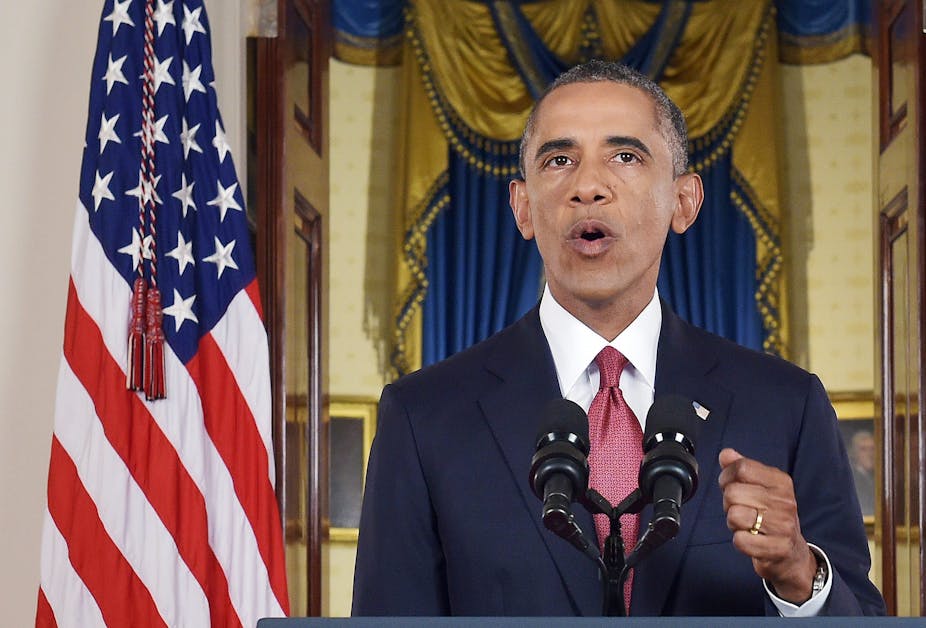A few years back, an honours student in linguistics at Macquarie University did a small study of American presidential oratory. The student chose four speeches, in which four different American presidents explained why they were taking America off to, or deeper into, “war”.
He started with Richard Nixon’s “Vietnamisation” speech in 1969 and ended with Nobel Peace Prize winner Barack Obama’s “surge” speech 40 years later, in 2009. Along the way, he took a look at George H. W. Bush’s 1991 call to arms and George W. Bush’s rallying of the troops for the 2003 invasion of Iraq.
The research showed that across party lines and geopolitical eras, the abiding characteristic of American belligerence is how familiar the script is. It’s as familiar as re-runs of I love Lucy, as predictable as two all-beef patties, special sauce, lettuce, cheese, pickles, onions on a sesame seed bun.
The latest in this homogenised, off-the-shelf, one-size-fits-all speechifying is Obama’s announcement of his “strategy” for “degrading and ultimately destroying” ISIL. On location from the Oval Office, Obama flapped his lips and said what presidents always say to justify just a bit more American killing.
If you wake up one day as a speechwriter for an American president, on the eve of a new act of American aggression, there’s a stock-standard set of memes perfect for the occasion.
First of all, mention that someone or other’s freedom is at stake. And that the foreign enemy is threatening not just his or their own people, but the peace of the region and the security of the world. And while the “domino theory” is out of fashion, you need to say something along the lines of “if we don’t fight them over there, we’ll have to fight them over here”.
Make sure you say how much America loves peace. Like really really totally loves it. Loves it so much America will even fight for peace.
Don’t worry if this means saying things Kafka would have baulked at. Nixon in 1969 said he could end the Vietnam war in one of two ways: by withdrawing American troops immediately, or by keeping them there. Then he explained how keeping American troops in Vietnam was obviously the better option for ending the war.
Make sure you say just how evil the enemy is. Mention that they don’t abide by national or international laws, something like: “In this conflict, America faces an enemy that has no regard for conventions of war or rules of morality.” Mention that they kill people, including women and children. And it’s best if you can say they “slaughter” or “murder” them.
Don’t hold back here. Make up stuff if you need to. Remember in Gulf War 1, we had Iraqi soldiers pulling premmie Kuwaiti babies out of incubators. And who could forget Saddam’s “human shredding machine” in the lead-up to the 2003 invasion? (Let’s not forget weapons of mass destruction too.)
You may even say that the latest mob are “unique” in their brutality, although Obama has just used this line. Next time round the enemy may have to be even more unique in their brutality.
This next bit sounds tricky, but I assure you it’s not: write the speech like America can defy Newton’s Third Law of Motion. Way, way back in 1687, Newton wrote that every action produced an equal and opposite reaction.
But American presidents are above that law. They know that whatever they do – invading countries with thousands of troops, dropping lots of nice big bombs, sending their ships to distant bays and ports – there’ll be no blowback. Things will turn out just the way they planned.
Don’t be afraid that some expert might go on the news and contradict the President’s strategy. The “military experts” are in fact the President’s chorus line, so up to their eyeballs in conflicts of interest that they couldn’t care less whether the “objectives” or the “strategy” even make sense.
And happily, even experienced public broadcast journalists just love a man in uniform. So, you don’t have to worry about what the latest round of “taking decisive action” could lead to.
But make sure you mention the consequences of “doing nothing”. In case you didn’t know, “doing nothing” here means not killing some people and not bombing stuff. Seeking alternatives to the use of military force comes under the heading of “doing nothing”, also called “standing idly by”, or occasionally “appeasement”.
Something like “we must weigh the cost of action, against the price of inaction” goes down very well.
If you’re in the midst of a war, or about to start one when the last one is hardly over, then don’t forget to mention the families who’ll “bear the heaviest burden of this decision”. You could mention that the President has, with a heavy heart, personally signed condolence letters to the family of “each American who gives their life in these wars”.
Finally, don’t forget the bit about how America is just really great, like really basically the greatest ever, and how on earth would the world get along if America sat on its hands?
You could say something like “America has often made the difference between chaos and community, fear and hope”, or “this is American leadership at its best” or even: “It is our responsibility to preserve world peace because no one else can do it.”
And to round it off nicely, try this: “Our cause is just, our resolve unwavering.”
The ingredients for a great American call to arms, while not fresh, turn out a winning combination every time. Why do these presidents, Republican and Democrat, all sound the same? Because they’re just the sidekicks to America’s greatest ventriloquist: the military industrial complex.
And what about the prime ministers of the Land Down Under? Just the puppets of the ventiloquist’s dummy.

